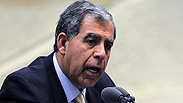
Deputy finance minister slams Defense Ministry request for funds
Mickey Levy responds to Defense Minister Ya'alon's request for additional funds for IDF, saying 'the army doesn't know how to manage their funds, they need to get their priorities straight.'
Deputy Finance Minister responded negativity to Defense Minister Moshe Ya'alon's request to transfer additional funds to the Defense Ministry and IDF, which he claims are facing an unprecedented financial crisis.
"The money is gone. The defense apparatus is in crisis, and we need to free up the defense budget now," Ya'alon said Friday.
In a possible bid to increase public support for their cause, the Defesne Ministry reported Friday afternoon that a yearly training exercise that was supposed to take place next month has been postponed, perhaps indefinitely, due to lack of funds.
A senior defense source said at the time that "The delay of this exercise is the first step on the road to an almost complete freeze of all training exercises in the IDF and the defense apparatus due to budget constraints."
Related stories:
The deputy finance minister, also from Finance Minsiter Yair Lapid's Yesh Atid party, slammed the request, saying that the Defense Ministry "should sit down and set their priorties."
He made the comments in the Shabbat-Tarbut events held in Holon Saturday.
"It is unconvciable that they are now requesting the funds, again. They do not know how to manage their budget, they need to sit down and set their priortoes straigrt. The defense budget is not more imprtooant than the budget of the Health Ministry. "
The Battle of the Budget
The battle over the Defense Budget began behind closed doors after Ya'alon told the Knesset Defense and Forigen Affairs committee that the army was cutting back on training amid a sevre financial crisis. He claimed that the military budget was cut by four and half billion NIS.
Military officials have reportedly been debating whether or not to go to the media to address the problem. Their fear was not only public confrontation with the political leadership, but primarily the possible damage to the IDF's deterrence capabilities should its financial weakness become known.
"The discussion over the defense budget is managed like a Turkish bazaar. Also, we do we have to pay a nonsensical tax on fuel for tanks and planes when public transportation is exempt from it?" said Ya'alon.
Treasury officials responded quickly saying that the defense bureaucracy is once again choosing the easy road instead of cutting back of excess military spending and bloated pensions.
In response to Ya'alon's remarks about a "Turkish bazaar", they asked to remind the defense minister that just a few months ago three billion shekels were added to the defense budget.
Meanwhile, Israel is pressing the United States to conclude a deal extending defense aid beyond 2017, when Washington's current $3 billion annual payouts to its Middle East ally expire, officials said on Friday.
They said a swift agreement on future US grants would help Israel's military draft a five-year austerity plan accommodating Prime Minister Benjamin Netanyahu's conservative government.
"It's difficult to budget into 2018 and 2019 without knowing what funds will be available," an Israeli defense official said.
Yet some are saying that even with an extension of fund from the US, defense officials won't be able to plan so far ahead considering that in the last year NIS 4.5 billion was cut from the budget and the IDF had to create a 6-month plan and in the middle of the year were forced to plan the next.
Until a few years ago, the IDF had a four year defense budget plan, but since IDF Chief of Staff Lt.-Gen. Benny Gantz began his tenure, the organization that is supposed to be capable of planning a decade ahead has been forced to work one year at a time.
In light of the unfolding budget crisis, others are sure to begin questioning Israel's planned purchase of 19 generation 5 F-35 fighter jets from the US at a total cost of $2.7 billion.
While manufacturers at Lockheed Martin have promised that the aircraft represents a tremendous leap forward in air combat technology, the project has hit several snags delaying production and forcing prices skyward.
Recent reports even claim that the stealth capabilities of the plane, one of its key technological advancements, are being down-played in favor of weapons accuracy.
Lockheed Martin said that they planes to be sold to Israel in 2016 will have full stealth capabilities as promised.










